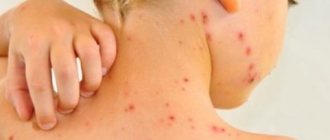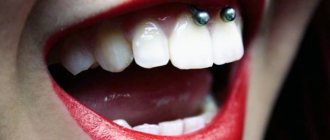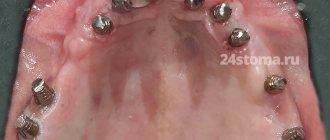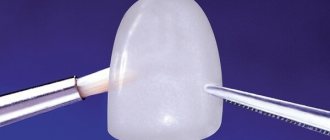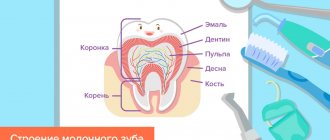What is this disease?
Herpetic stomatitis is a pathological process that develops in the mucous membrane lining the oral cavity. The causative agent of this disease is herpes simplex virus type 1. In children under the age of five, this virus is detected in 60% of all cases. By adolescence, it is detected in the vast majority of people. Herpes stomatitis in children develops during the baby’s first contact with the virus. This occurs most often before the age of three.
The high incidence is explained by:
- low level of production of own antibodies;
- immaturity of cellular immunity;
- the fact that the baby does not receive antibodies from mother's milk;
- high reactivity of the child's body.
If the baby is bottle-fed, he may get sick in the first months of life. Viral infection often goes into a latent state. It persists in the nerve ganglia.
A small pimple on the palate is very common: forum
It happens that people, when pimples appear on the roof of their mouth, begin to look for an answer to the question - where did they come from - on forums. Here's what other netizens say about this disease:
Review 1
Review 2
Review 3
Causes
The cause of the development of the pathology is the herpes simplex virus type 1. It belongs to DNA viruses belonging to the Herpesviridae viral family. The pathogen multiplies rapidly in the epithelial cells of the oral mucosa. Then it enters nearby lymph nodes (submandibular) and continues to reproduce in them. Then it enters the blood and migrates to the parenchymal organs (spleen, liver, kidneys). There it multiplies and enters the bloodstream again. As a result, it again appears in large quantities in the epithelial cells of the skin and mucous membranes. They are massively defeated. It is localized in the oropharynx, oral cavity, nose, lips, and nearby skin. Stomatitis and herpes of the skin and mucous membranes develop when the infection generalizes simultaneously.
Children become infected with it as follows:
- through contact and everyday life (using shared utensils, toys, through kissing);
- airborne (coughing, sneezing);
- from a sick mother to the fetus through the placenta or during childbirth.
A baby can become infected from sick adults, children, and carriers.
The following factors contribute to the development of the disease:
- previously suffered inflammatory processes;
- previous antibiotic therapy;
- deficiency of microelements and vitamins in the body;
- mechanical damage to the skin and mucous membranes;
- insufficient fluid intake;
- poor oral hygiene.
In children, the virus is especially easily transmitted through contact. The infectious process quickly spreads to healthy areas.
How to treat white pimples on the palate of a child: methods
Regardless of what caused acne to appear on the palate of a child’s mouth, treatment has some general rules:
- First of all, take constant care of your oral cavity. After eating, always treat the affected areas with an antiseptic, also do not forget to do this in the morning and evening
- Eliminate for a while any food that irritates the palate - spicy, hot and sour.
- Food should be as soft as possible, because hard food can also cause inflammation.
- It is strictly forbidden to squeeze or cover pimples. This will only make it worse
- Drink plenty of fluids to help flush toxins and allergens out of your body
Classification
According to the flow, acute, chronic, and wave-like variants of the pathology are distinguished. The following degrees of severity of the pathological process are distinguished:
- Mild - it is typically characterized by a slight increase in body temperature, moderate inflammation of the mucous membrane in the mouth, and enlargement of regional lymph nodes. Rashes form on the mucous membrane and skin.
- Medium – high temperature rises. Severe weakness and sudden deterioration in health. The baby begins to vomit and the pain in the mouth increases. Significant rashes appear in the mouth and the skin around it.
- Severe - a severe headache is added to the pathological process. High temperature rises, severe muscle pain. Not only regional but also distant lymph nodes enlarge. The rashes are located not only in the oral cavity, but on the skin next to it. They appear on the mucous membrane of the eye, on the eyelids, and on other parts of the face.
The severity of the pathology depends on the viral load (the amount of virus in the body) and the general reactivity of the body.
general information
Streptodermia refers to a pathology caused by streptococci. If we talk about the external manifestations of the disease, blisters and purulent rashes that itch appear on the skin.
Streptoderma in children can occur in two different forms: acute and chronic. Acute is characterized by pronounced symptoms, and chronic - by periodicity.
According to the degree of damage, the disease is classified into superficial, deep and intertriginous. Each form has a specific feature.
Clinical manifestations
Stomatitis in children is characterized by a gradual onset of the disease. Clinical signs of the disease do not appear immediately after infection. The incubation period is typical for this pathology; it lasts from two days to three weeks.
Symptoms of herpetic stomatitis in children appear starting from the prodromal period.
Each period has its own clinic:
- Latent – lasts up to two weeks. The child's sleep is disturbed and he refuses to eat. The baby becomes restless and whiny. He has increased salivation, possible nausea and vomiting. The lymph nodes are enlarged and painful on palpation.
- The height of the disease - at this time rashes appear on the skin and mucous membranes. They are located on the soft, hard palate, gums, cheeks, lips and tongue. They are group or single, up to three millimeters in size. They are thin-walled bubbles filled with a clear liquid. Their formation lasts up to four days. The vesicles quickly open, then erosions and painful aphthae form. They are shallow ulcers covered with a white coating. The mucous membrane in the mouth is swollen and bleeding. The child develops a high temperature of up to 40 degrees. A runny nose, cough, and conjunctivitis occur.
- Fading - aphthae, erosions gradually heal and epithelialize. These formations heal without scarring. Often there is a wavy course of the disease. The periods of appearance of rashes alternate with rises in temperature.
The illness usually lasts up to two weeks. In children under one year of age, generalization of the process is possible. The development of sepsis, damage to all internal organs and meninges is likely.
Red, transparent, white pimples appeared on the palate of an adult: reasons
As a rule, when pimples appear on the roof of the mouth, a person immediately begins to panic. And in fact, this is how various diseases of internal organs can manifest themselves. Let's find out what caused this reaction.
- Dental diseases
The very first and most common reason is dental problems. This could be a simple neglect of hygiene rules, injuries, improper installation of prostheses, and so on.
For example, when the root of a tooth becomes inflamed, small pimples appear. They can be white or yellowish. Such rashes are called stomatitis or inflammatory lesions.
- Infections
Infection in the mouth
Infections also often cause rashes in the mouth. In adults, measles or chickenpox usually manifest this way. As a rule, children become infected with this disease, but it is possible that adults will also become ill. If you really have an infection, your temperature will certainly rise and your general condition will worsen.
- Herpetic infection
With this disease, transparent pimples with liquid appear. The disease can worsen if the immune system is weak. As a rule, no special treatment is required for such manifestations, but it is advisable to ensure that the rash is not damaged. Otherwise, the infection will spread.
- Glossitis
Red bloody pimples appear due to poor diet, drinking alcohol in large quantities and allergies. Usually, pimples hurt when touched. It is advisable to start treatment as quickly as possible, otherwise a crust will appear on the surface.
- Syphilis
This disease can also manifest itself in this way. As a rule, pimples are white and do not cause any discomfort. The rash varies and does not necessarily appear on the roof of the mouth.
Diagnostics
A patient suspected of having this disease is examined by a dentist. He asks the child’s parents about how the disease progressed. The diagnosis is established on the basis of the characteristic clinical picture of stomatitis, revealed during examination, anamnesis and characteristic complaints. Upon examination, typical mucosal lesions are revealed.
To confirm the diagnosis, laboratory testing of scrapings of the oral mucosa, the contents of ulcers, the patient’s saliva and blood is used.
The following are used for research:
- cytopolymerase chain reaction;
- immunofluorescence method;
- serological blood tests (RSC, ELISA, immunoglobulin M test);
- HSV test for the detection of immunodot G-specific glycoprotein.
These methods are used only for severe infections, as they are quite expensive.
How to recognize a food allergy and not confuse it with other diseases?
Most often, in order to diagnose a food allergy, a doctor only needs an examination and a detailed interview with the mother. Mom can point out that she herself has a food allergy or point the doctor to a specific food. Sometimes it is difficult to make such a diagnosis right away. Then the doctor may order an examination. First, a general blood test. And then, if necessary, specific allergy tests: examination for immunoglobulins, and at a later age, provocative tests. It is these tests that were chosen as the most informative in the latest clinical recommendations. In addition, your baby may need to consult an allergist, dermatologist or gastroenterologist, depending on the symptoms that are bothering him. And also, additional examination from the gastrointestinal tract.
Treatment
Treatment of herpetic stomatitis in children with mild and moderate forms is carried out on an outpatient basis. In severe cases and the development of complications, the baby is hospitalized. Treatment is carried out under the supervision of a pediatric dentist or periodontist.
Children are prescribed bed rest and a diet with pureed, non-irritating food. He is given separate hygiene items and dishes. Plenty of warm fluids are recommended.
The following drugs are prescribed:
- Non-steroidal anti-inflammatory drugs (Nise, Paracetamol, Nurofen) are used to relieve temperature and inflammatory reactions.
- Antihistamines (Clemastine, Loratadine) are used to relieve swelling of the mucous membranes.
- Antiviral drugs (Famciclovir, Acyclovir, Zovirax) are used at the beginning of treatment or in severe cases.
- Immunomodulators (Lysozyme, Gamma globulin, Thymogen) are used to enhance immunity.
During treatment, vitamin-mineral complexes and fish oil are used in monthly courses.
Local drugs that act directly on the mucous membrane are widely used.
For local treatment of herpetic stomatitis the following are used:
- antiseptics (Hexoral, Miramistin) - they are used to rinse the mouth every four hours for two weeks;
- ointments and gels with anesthetics (Kamistad, Lidochlor gel) are used for pain relief, they are lubricated with mucous membranes three times a day for up to two weeks;
- antiviral agents (Ganciclovir, Acicovir) - destroy the viral cell, gums are treated with these ointments five times a day, two weeks;
- proteolytic enzymes (Trepsin, Chymotrypsin) are used to cleanse the necrotic surfaces of ulcers; they are washed with these solutions twice a day.
- rinsing with decoctions of medicinal herbs (calendula, chamomile, sage) is carried out after each meal for up to two weeks;
- epithelializing ointments (Solcoseryl, Methyluracil) are used to enhance the healing of erosions and ulcers, used in the recovery stage, used up to four times a day for ten days.
Physiotherapy is applied locally. Irradiation of affected mucous membranes with ultraviolet and infrared rays is used.
Prevention
Preventive measures are aimed at preventing infection. This presents certain difficulties, since the vast majority of the population is infected with it. It is better if the child gets sick from it at an older age.
For this it is recommended:
- avoid contact with infected people;
- will provide personal utensils and personal hygiene products for the child;
- Kissing people with herpetic rashes is prohibited;
- strengthening the baby's immune system.
It is recommended that the child be provided with adequate nutrition and regularly given vitamin and mineral complexes.
